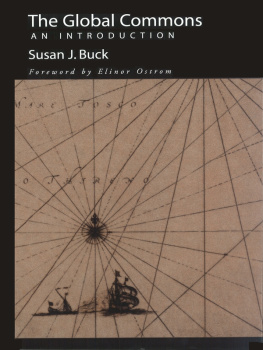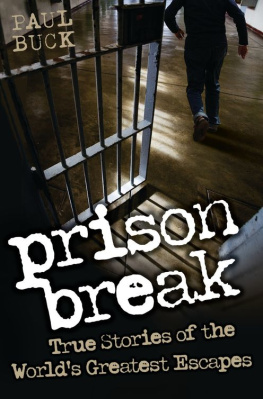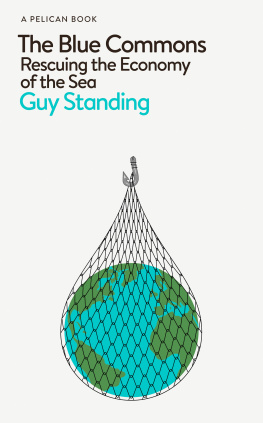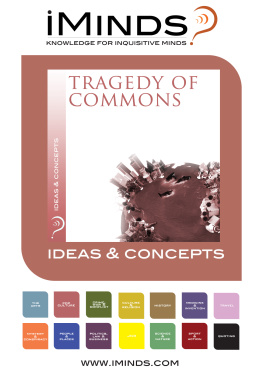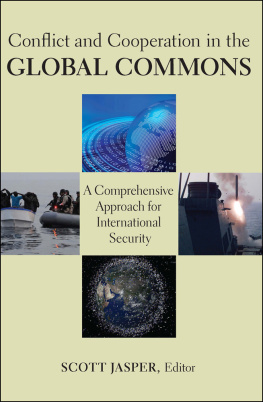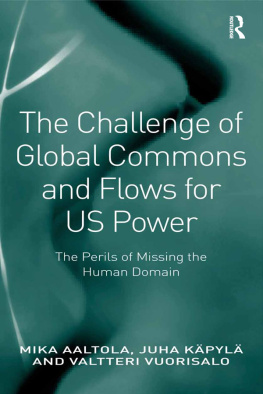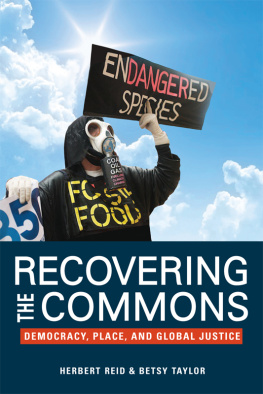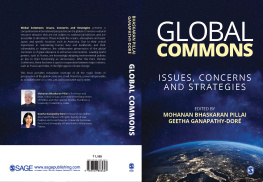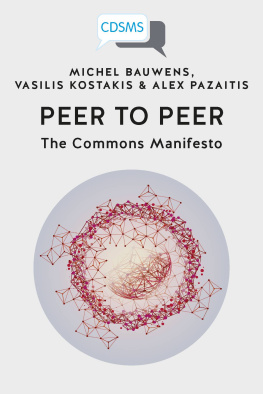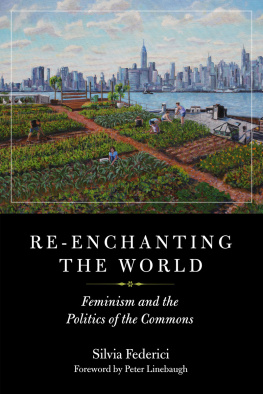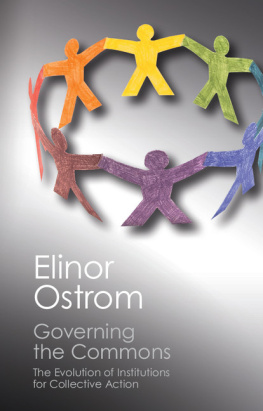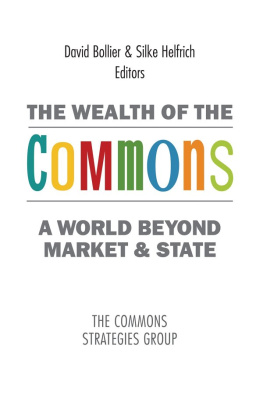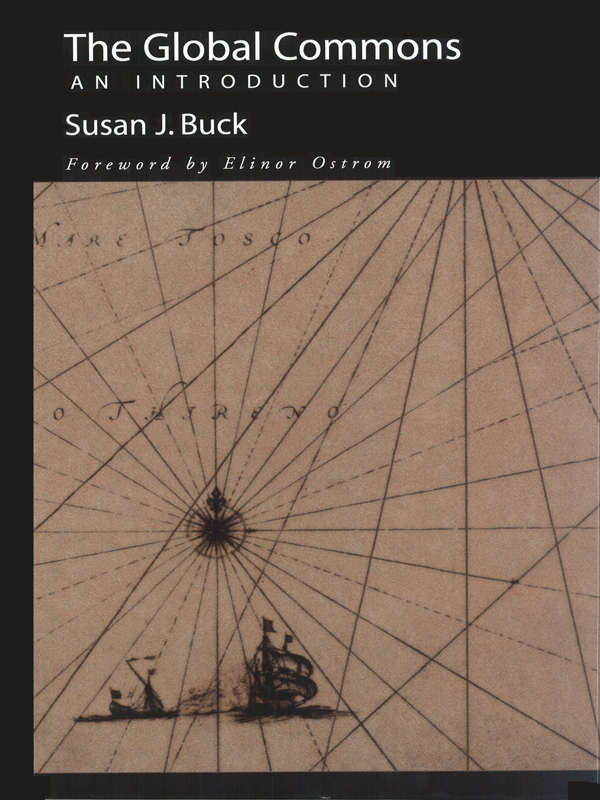Acknowledgments
Many excellent scholarly works rooted in international relations and comparative politics have discussed the global commons. This book is written to bring another perspective to the discussion: the extensive and rich analytic frameworks in public administration, political science, and economics that have been developed to study common pool resources.
As most works do, this book took on a life of its own, and I could not have completed it without help.
Dr. Albert Utton at the University of New Mexico School of Law generously gave me an office during the fall and spring of 19911992. Support for a related project on the management of trans boundary resources in Central Asia came from the National Science Foundation (grant number SES#-914766). My university, the University of North Carolina at Greensboro, provided a course release during the fall of 1992 to prepare an honors seminar on the global commons, an activity that was very useful to me in organizing my thoughts.
Two dear friends, Betty Morgan and Pam Mason, read drafts of various chapters; their constructive comments helped me to clarify my ideas and my writing. Joe Morgan, cartographer extraordinaire, made the map of the Antarctic region that appears in chapter 3. Dr. Milton Moss reviewed the critical chapters setting out the definitions and analytic framework. Lynda Kellam was my cyberspace research lifeline during the copyedit stage while I was in Scotland under the auspices of a Fulbright award examining Scottish wildlife management.
I have been singularly fortunate in my research assistants. Tiffany Bolick saw me through the first draft of this book with many trips to the library and requests for interlibrary loans. Karen Titus Markovics researched and wrote the descriptive material that eventually became the boxed text, and she also helped throughout the early stages of manuscript preparation. Mitchel Jofuku, now a member of the New Mexico State Bar but then a third-year student at the University of New Mexico School of Law, performed miracles, unearthing books and articles and steering me through the arcane corridors of his law library. Andrew Esposito organized and reconciled all the notes and the bibliography over a long holiday weekend.
The second draft of this book was written between 1996 and 1997. Mary Hennessey, my indispensable graduate research assistant, carried out all the library work, from locating the latest research to picking up books on interlibrary loan. She spent one lovely spring week proofreading the manuscript, verifying notes, and generally catching my sins of omission and commission. Her thoroughness was remarkable.
Pat Harris was the copyeditor for this book. She used the Internet to verify treaties and dates, which spared me a great deal of time-consuming work, and her editing was meticulous and even creative.
I am especially grateful to Todd Baldwin, senior editor at Island Press, for his guidance during the writing of this book. His comments on the text clarified my thinking and strengthened my writing. He bolstered my confidence when it flagged. He restored my sense of humor as the deadline loomed and the project lagged. It is a true blessing to have an editor who knows content as well as style.
To Elinor Ostrom I owe an incalculable intellectual debt because it was her work on economics and institutions in the governance of common pool resources that broke me out of my narrative rut.
I gladly share with these friends and colleagues any plaudits won by this book; any criticisms should be laid at my door alone.
Susan J. Buck
Greensboro, North Carolina
May 1997
ABOUT ISLAND PRESS
Island Press is the only nonprofit organization in the United States whose principal purpose is the publication of books on environmental issues and natural resource management. We provide solutions-oriented information to professionals, public officials, business and community leaders, and concerned citizens who are shaping responses to environmental problems.
In 1998, Island Press celebrates its fourteenth anniversary as the leading provider of timely and practical books that take a multidisciplinary approach to critical environmental concerns. Our growing list of titles reflects our commitment to bringing the best of an expanding body of literature to the environmental community throughout North America and the world.
Support for Island Press is provided by The Jenifer Altman Foundation, The Bullitt Foundation, The Mary Flagler Cary Charitable Trust, The Nathan Cummings Foundation, The Geraldine R. Dodge Foundation, The Ford Foundation, The Vira I. Heinz Endowment, The W. Alton Jones Foundation, The John D. and Catherine T. MacArthur Foundation, The Andrew W. Mellon Foundation, The Curtis and Edith Munson Foundation, The National Fish and Wildlife Foundation, The National Science Foundation, The New-Land Foundation, The David and Lucile Packard Foundation, The Surdna Foundation, The Winslow Foundation, The Pew Charitable Trusts, and individual donors.
Acronyms
| AAOE | Airborne Antarctic Ozone Experiment (1987) |
| ACMRR | Advisory Committee on Marine Resources Research |
| AEC | Atomic Energy Commission (United States) |
| AOSIS | Alliance of Small Island States |
| ARABSAT | Arab Satellite Communication Organization |
| ASOC | Antarctic and Southern Ocean Coalition (1978) |
| ATCM | Antarctic Treaty Consultative Meeting |
| ATS | Antarctic Treaty System |
| BIOMASS | Biological Investigation of Marine Antarctic Systems and Stocks |
| CCAMLR | Convention on the Conservation of Antarctic Marine Living Resources |
| CCIR | International Radio Consultative Committee (Comit Consultatif International des Radio Communications) |
| CCITT | International Consultative Committee for Telephony and Telegraphy (Comit Consultatif International Telegraphique et Telephonique) |
| CCOL | Coordinating Committee on the Ozone Layer |
| CEP | Chile, Ecuador, and Peru |
| CFC | Chlorofluorocarbon |
| CHM | Common heritage of mankind |
| CIS | Commonwealth of Independent States |
| CITEJA | International Technical Committee for Aerial Legal Experts (1925) |
| CITES | Convention on International Trade in Endangered Species of Wild Fauna and Flora |
| CLS | Critical legal studies |
| COP1 | First Conference of the Parties to the United Nations Framework Convention on Climate Change (1995) |
| COPUOS | Committee on the Peaceful Uses of Outer Space (also UNCOPUOS) |
| COSPAR | Committee on Space Research |
| COSTED | Committee on Science and Technology in Developing Countries |
| CRAMRA | Convention on the Regulation of Antarctic Mineral Resource Activities |
| CSAGI | Special Committee on the Geographical Year (Comit Spcial de lAnne Gophysique) |
| DBS | Direct broadcast satellites |
| DSDP | Deep Sea Drilling Program |
| DSIR | Department of Scientific and Industrial Research (New Zealand) |
| DVDP | Dry Valley Drilling Project |
| EAMREA | Environmental Impact Assessment of Mineral Resource Exploration and Exploitation in the Antarctic (Group of Specialists, SCAR) |

